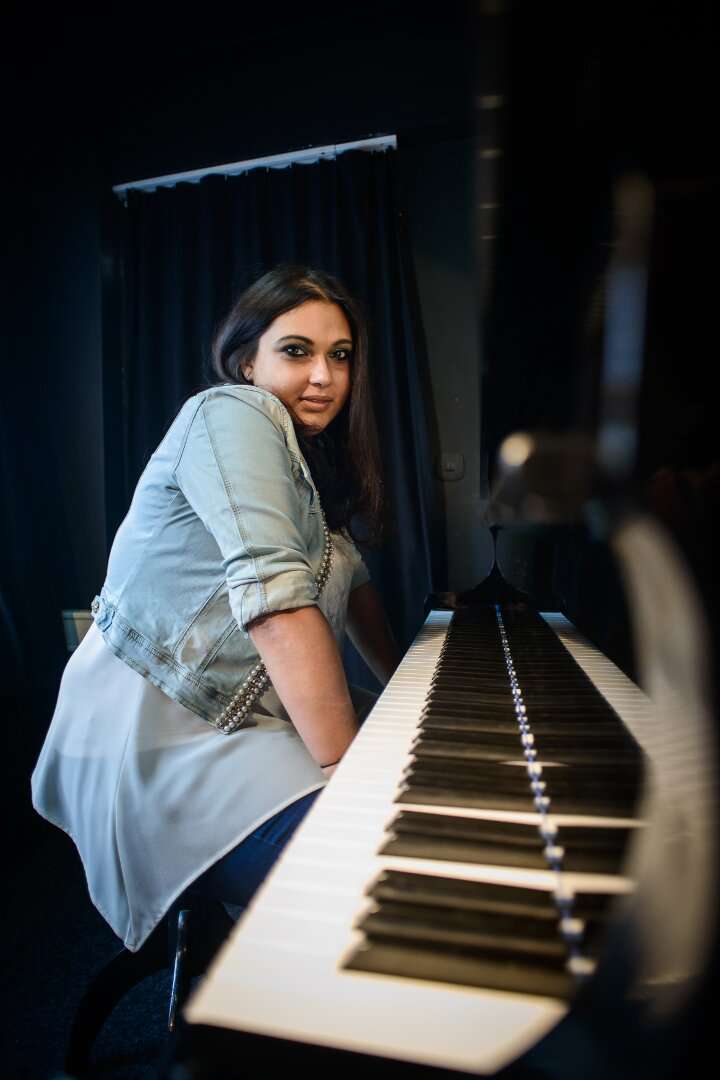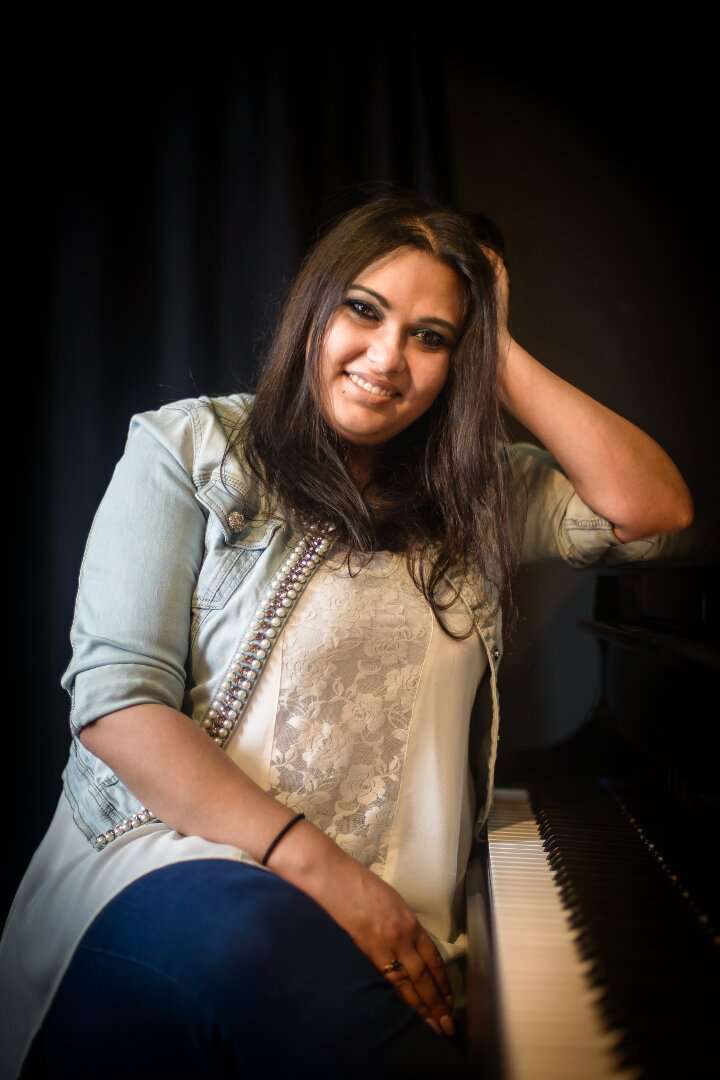Pavlína Matiová was born into a musical family in Roudnice nad Labem (Czech Republic). Her parents and grandparents were active musicians. Pavlína’s grandmother, for example, was a saxophonist who travelled with her father’s band in order to play at dance events. Pavlína and her sister Jitka graduated as vocalists from International Conservatory of Prague and are both professional musicians.
Interview with Pavlína Matiová January 2018

Pavlína Matiová, wearing a long white top and denim jacket seated at the piano, with a close-up of the keys.
Rights held by: Petr Vrabec | Licensed by: Pavlína Matiová | Licensed under: CC-BY-NC-ND 4.0 International | Provided by: Pavlína Matiová – Private Archive‘I think that form of pedagogy is the best – learning through play.’
IJ: Why did you choose voice as a specialisation, instead of piano, which I understand you loved?
Pavlína Matiová: I thought I wouldn’t be able to learn a living as a pianist. And I decided to learn a “trade”, so I completed secondary school with a diploma in pedagogy. But in my fourth year I started studying at the conservatory anyway, so for a year I was at two schools simultaneously.
IJ: And why did you make the decision in your fourth year? Did something unusual happen?
PM: That summer, I had taken part in a summer camp with [the Romani singer] Ida Kelarová, where I learned that a new conservatory was opening in Prague. I didn’t have high hopes for my application, but they accepted me. I had originally planned to go to university in Ústí nad Labem. If the conservatory hadn’t been founded, I’d probably be a teacher in Ústí today.
IJ: Five years ago, you put on a musical with some children from a special-needs school. With your pedagogical and music performance degrees, this seems like the perfect synthesis of your skills.
PM: This is what really fulfils me – I’m dedicated to teaching. I began as a Romani mentor in the town of Slaný. That was a two-year job that resulted in a musical that I had created with local children. I think that form of pedagogy is the best – learning through play – that’s what works. I’ve also taught at the International Conservatory, where I’ve worked for five years.
‘I consider Romani music to be a healthy type of singing.’
IJ: What style of music do you feel closest to?
PM: Traditional Romani music! I can sing it for two days straight and it’s not physically taxing, unlike classical music, for example. I consider Romani music to be a healthy type of singing, and it requires virtually no effort on my part.
IJ: You also direct a co-ed children’s choir. How did that get started?
PM: For last year’s International Romani Day celebrations, we had the theme ‘Together we can.’ Our director, David Tišer [founder of the Ara Art socially progressive theatre] had the idea of putting together a choir of Romani and non-Romani children to sing the Romani anthem. I would also like to form a Romani-Czech adult choir, but that will be at some point in the future.
IJ: What do you personally get out of your work with children?
PM: It brings me joy and energy. Although it’s true, of course, that at times it takes energy out of me, especially during individual lessons. But when I work with a group of kids, I’m pumped up for the rest of the day.
IJ: Do you think the theoretical education one receives in music schools is important?
PM: Yes, it’s important for people who want to devote themselves to music, including those who want to teach it. And theory helps me a lot when I’m studying something new, because it cuts down on my preparation time.

Pavlína Matiová seated at the piano, smiling.
Rights held by: Petr Vrabec | Licensed by: Pavlína Matiová | Licensed under: CC-BY-NC-ND 4.0 International | Provided by: Pavlína Matiová – Private ArchiveIJ: What is your greatest success to date?
PM: The Auschwitz Requiem. I often think back on that performance with fondness, even though rehearsing for it was lengthy and difficult.
IJ: What are you currently working on?
PM: I’m still involved with projects in creative education. And I’m in three musicals, in addition to the Ara Art theatre programme. I like to say that I love singing and that theatre is my love. Musicals are a combination of both, and it’s incredibly beautiful work to become someone else for two or three hours at a time.
Rights held by: Inka Jurková| Licensed by: Inka Jurková| Licensed under: CC-BY-NC 3.0 Germany | Provided by: RomArchive



